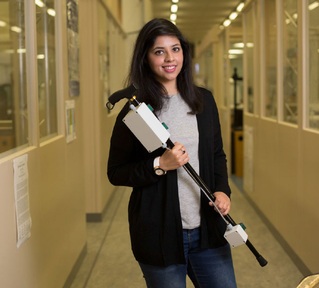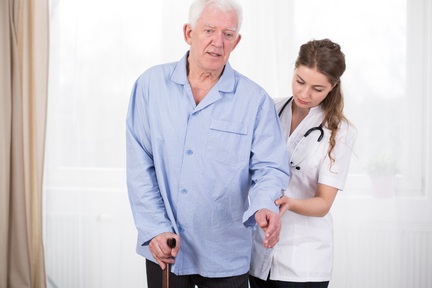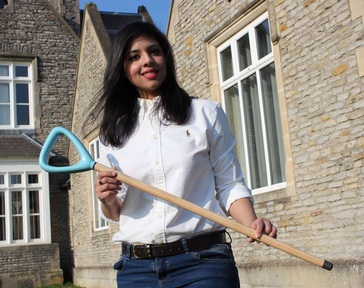Graduate invents 'smart' walking stick to help people with Parkinson's
The granddaughter of a man with Parkinson’s has invented a ‘smart’ walking stick that could help thousands of people living with the condition.
Neha Shahid Chaudhry was inspired to create the ‘smart’ walking stick to improve the lives of other patients with the condition after watching her late grandfather struggle to remain mobile in the last few years of his life.

Ms Chaudhry's grandfather Zia-U-Din, had Parkinson’s disease causing him to struggle to move about for seven years while living with condition, while having repeated falls and having his joints seize up.
Recent product design technology graduate of the University of the West of England (UWE Bristol) and founder of start-up company ‘Walk to Beat’, Ms Chaudhry has been overwhelmed with the response to her product. So far, the walking stick has been successfully tested by dozens of people living with Parkinson’s and the NHS, while the charity Parkinson’s UK have expressed an interested in the product.
Speaking about the response to her product, Ms Chaudhry said: “When I gave the product to patients to be tested, there were smiles on their faces and they were saying ‘This could really work’. It seems unbelievable that I have made something which could help people, even if it is to a small extent. It’s a great feeling for me and the patients are happy somebody is thinking of them.
Making lives better
“There isn’t a cure for Parkinson’s – medication just prolongs the condition and helps you stay alive for longer. My aim is to make their lives a bit better while they are dealing with it.”
Parkinson’s is a progressive neurological condition, which causes people to have a reduction in the amount of the chemical dopamine because specific nerve cells in their brain have died. Without dopamine, people can find it can take them longer to do things, making everyday activities such as eating, dressing or using the phone difficult and frustrating.
The three main symptoms of Parkinson’s are tremor, muscle stiffness and slowness of movement, though not everyone will experience the same symptoms.
More than 127,000 people living in Britain have Parkinson’s and regularly experience joint freezing and abnormal gait symptoms, while every hour someone in the UK is told they have Parkinson’s, most of these people are aged over 50, though younger people can be diagnosed too.
People living with Parkinson’s can also experience other issues including: tiredness, pain, depression and constipation, which can have an impact on their day-to-day lives with symptoms often worsening over time.
Solving a 'real world' problem

Ms Chaudhry is an international student, originally born in Pakistan, and came up with the idea for the product in 2014 as part of her final-year end-of-course project where she was challenged to devise a product that could solve a ‘real world’ problem.
The device is able to detect when a user’s limbs have frozen so that they cannot continue walking, recognising a pause in motion and causing the stick to vibrate to help the user regain their rhythm and start moving again.
The mobility aid resembles a conventional walking stick so as not to draw attention to the user and their condition. Using sophisticated technology in its handle and a sensor, the stick is able to detect when a user has stopped taking steps, once it identifies if there user has paused, the stick emits a pulsating beat to help the user resume walking again.
Ms Chaudhry commented: “People with Parkinson’s get jammed in one place and can’t step forward - it can cause falls. They need any kind of rhythm or sequence to get them started again, because it acts as a reminder. The beat is inside the handle – it senses when you stop and turns off automatically when you start walking again. Patients say it encourages them to walk and they learn to pace with it.
Creating dignified products and tackling stigma
“I spent three to four-months doing research, talking to patients, going to care homes and attending Parkinson’s UK drop in sessions.
"More than the disease itself, a big problem is the impact on social lives. Some other products for people with Parkinson’s have a stigma attached to them – they look like products for disabled people. Because one of the symptoms is tremors, patients drink from sippy cups and use children’s cutlery because it is easier to grip, but that seemed undignified to me.

“I wanted to design something that was aesthetically pleasing and discreet, so I could solve a problem in an almost secret way. The beat can only be felt by the user - it cannot be heard or seen.”
Ms Chaudhry added: “My granddad had this disease for seven years so I knew a bit about it - that was my starting point. He used to freeze a lot and had a lot of injuries because of falling. “He used to get really happy when he had good days, when he was able to walk without a stick. But we wouldn’t let him out alone. He once fell in the road and had a major injury.”
Social enterprise ‘Walk to Beat’ is based in the technology incubator at the Bristol Robotics Laboratory on UWE Bristol’s Frenchay campus, where Ms Chaudhry received support to develop the walking stick’s sensor and produce a final prototype device from the Robotics Innovation Facility (RIF).
Associate professor for knowledge exchange in manufacturing based in the RIF, Farid Dailami, said: “We are delighted to have helped Neha take her idea from a very brief outline to a fully functioning prototype that she has used to show off the feasibility of her original concepts. The Walk to Beat walking stick can make a real difference to the lives of people suffering from Parkinson’s, and we are looking forward to providing further support and helping realise its potential.”
Ms Chaudhry received further support from UWE Enterprise, which helps students and recent graduates to establish and run businesses and was awarded a £15,000 grant from UWE Bristol’s Better Together Fund to make her product a reality.
Enterprise development manager at UWE Bristol, Mhairi Threlfall, added: “Neha’s passion driven by personal experience to tackling problems associated with Parkinson’s is astounding. She has worked tirelessly to produce her product and develop her business plan. We are supporting her now to look at how this fantastic creation can be commercialised.”
Below Neha Shahid Chaudhry speaks to the Robotics Innovation Facility (RIF)at the Bristol Robotics Laboratory about her product.
Latest Features News
 25-Nov-19
2019 Election: Boris Johnson leaves social care in 'too difficult box' but Labour vows to end 'crisis'
25-Nov-19
2019 Election: Boris Johnson leaves social care in 'too difficult box' but Labour vows to end 'crisis'
 18-Oct-19
Podcast: Wendy Mitchell and dementia: 'My biggest fear is not knowing who my daughters are'
18-Oct-19
Podcast: Wendy Mitchell and dementia: 'My biggest fear is not knowing who my daughters are'
 27-Sep-19
Exclusive: Care minister backs care workers' call for time off to grieve and attend funerals
27-Sep-19
Exclusive: Care minister backs care workers' call for time off to grieve and attend funerals
 19-Sep-19
Podcast: Gyles Brandreth says poetry helps ward off dementia
19-Sep-19
Podcast: Gyles Brandreth says poetry helps ward off dementia
 30-Aug-19
Edinburgh Fringe funnyman joins comics facing toughest audience at care home gig
30-Aug-19
Edinburgh Fringe funnyman joins comics facing toughest audience at care home gig